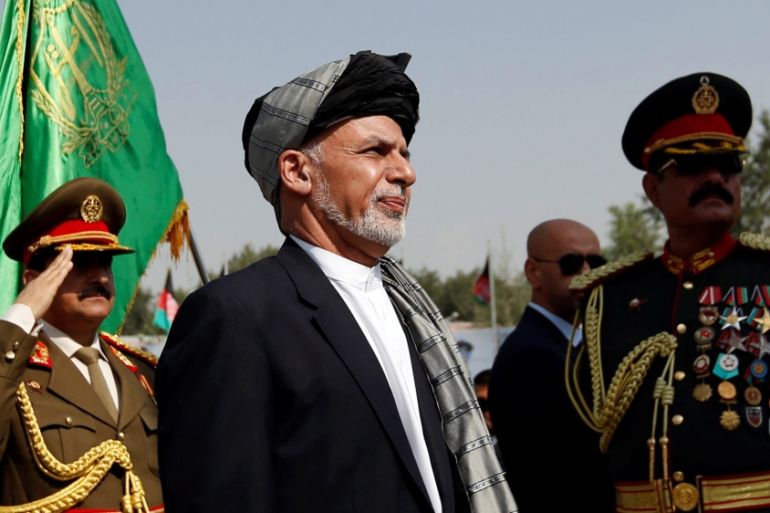Ashraf Ghani is not an ethnonationalist
I have known President Ashraf Ghani for a while and I see him as a unifying force in Afghanistan.

On February 5, in an article published in the opinion section of Al Jazeera English, author Eisa Khan Ayoobi classified Afghan President Ashraf Ghani as an “ethnonationalist”, surprising many people who have been following Ghani’s political career and tenure as president closely.
I have known Ghani personally for several years – I served as the senior policy adviser at the Afghanistan Security Transition Commission which he chaired, I was a member of his electoral campaign team on behalf of the Afghanistan Social Democratic Party, and for the past year, I have been serving as a deputy minister in his National Unity Government. I can confidently say that the president I know and work closely with is not an ethnonationalist.
Keep reading
list of 4 itemsHas the Taliban kept its promises in Afghanistan?
Ghani unlikely to have fled Kabul with millions in cash: Report
Afghan ex-President Ghani defends decision to flee the country
In his article, Mr Ayoobi implied that President Ghani came to power as result of a fraud-ridden election. It is true that the 2014 presidential election in Afghanistan was a difficult one, with widespread allegations of irregularities. But in September 2014, Afghanistan’s election commission conducted a UN-sponsored audit of all votes to lay the aforementioned fraud allegations to rest and declared Ghani as the legitimate winner of the election.
Even though Ghani’s victory was confirmed by both local authorities and independent international observers, the Afghan society was still deeply divided following the challenging electoral process. The Pashtun majority in the country, who overwhelmingly voted for Ghani, was content with the final election result, but his rival Abdullah Abdullah’s supporters were still dissatisfied. To bridge these divisions within the society, even though he was under no obligation to do so, Ghani agreed to the formation of a National Unity Government (NUG) in which he would share power with Abdullah. When President Ghani visited Washington in March 2015 along with Abdullah – who had become Afghanistan’s first chief executive officer thanks to the agreed power-sharing mechanism – the then US foreign secretary John Kerry applauded Ghani for taking such a unifying stance following the election.
“[Ghani] was not required by any law, by any rule, by any precedent to share power and create a unity government,” Kerry said. “But, he did so because he believed it was in the best interests of Afghanistan and it was the best way to move forward.”
Therefore, the formation of the NUG in itself can be seen as a clear indication that President Ghani is not an ethnonationalist but a unifying force working to bring the divided Afghan society together.
Ghani owed his electoral success to the Pashtun community, yet he still made certain that different ethnicities of Afghanistan are represented in his government. Today, those chosen by Ghani as ministers, heads of powerful independent directorates and key advisers are not only Pashtuns. Some of Ghani’s most powerful ministers and closest advisors are also non-Pashtuns or Dari-speakers. He also makes second-tier appointments, such as deputy ministers, based on merit and not ethnicity. Ghani even angered or alienated some Pashtun activists who actively supported him during his electoral campaign by not offering them positions in his government.
According to the Afghan constitution, Pashto and Dari are the two official languages of the state. President Ghani, an ethnic Pashtun, delivers almost most of his public and official speeches in Dari – the variety of the Persian language spoken in Afghanistan. Similarly, he speaks in the cabinet and other high-level meetings mostly in Dari. He does so intentionally to demonstrate that he is the leader of Afghanistan and not merely the representative of the Pashtun majority that voted for him.
It must be noted that Afghanistan’s Pashtun establishment has traditionally played the role of “Big Brother”, offering candidates from ethnic minorities powerful positions in the government in an attempt to reassure minorities that they are an important part of the Afghan society. President Ghani’s political behaviour with regards to dealing with Afghanistan’s ethnic minorities fits very well with this unwritten rule that has long been practiced by Afghanistan’s Pashtun rulers. Some Pashtun political circles are increasingly critical of such conduct and consider it as a gateway to the gradual marginalisation of the Pashtun majority, while others view it as a political necessity to keep the multiethnic nation united. President Ghani clearly agrees with the latter group.
The peace deal President Ghani signed with Hezb-i-Islami party leader Gulbuddin Hekmatyar should also be seen as a great breakthrough in peace efforts and unification of the Afghan society. Hekmatyar is not merely a tribal chief but the leader of one of the most influential Islamist political parties in the country. The peace agreement that brought him into the mainstream politics was based on national consensus. The agreement was widely welcomed both nationally and within international circles, as it was for the greater good of the country. This agreement was welcomed because many people agree that Hekmatyar doing politics within the confines of Afghan constitution is a thousand times better than a scenario in which he takes up arms against the state, jeopardising our national security.
In this context, it is clear that President Ghani cannot be classified as an “ethnonationalist”. Of course, Ghani may be labelled as a nationalist in the broader sense, as he is a die-hard patriot, but his patriotism is not in any way limited to the Pashtun ethnicity. So far, he has played the role of a unifying figure for all Afghans, and this will definitely give him an edge over his political rivals in the upcoming presidential election.
The views expressed in this article are the author’s own and do not necessarily reflect Al Jazeera’s editorial stance.
